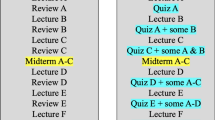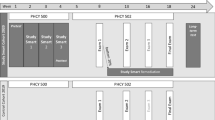Abstract
The use of questioning to elicit student thinking is one of the cornerstones of ambitious teaching; thus, supporting prospective teachers in this complex practice is a core objective of mathematics teacher education. In this paper, we examine the academic rigor of the sustained questioning sequences prospective teachers use during instruction to elicit student thinking and the possible factor lesson planning plays in enacted sequences involving academically rigorous questions. We analyzed the questions they asked during lessons in an early field experience and traced how prospective teachers prepared for those questions as represented in their lesson plans. From our analysis, we found prospective teachers used three types of sustained questioning sequences when eliciting student thinking in the enactment of the lesson. Further, we found evidence suggesting a connection between the questions asked during enactment of a lesson and the quality of questions prospective teachers incorporated into their lesson plan. These findings inform how mathematics teacher educators can support prospective teachers during lesson planning to prepare to elicit student thinking in productive ways.




Similar content being viewed by others
References
Arbaugh, F., Graysay, D., Konuk, N., & Freeburn, B. (2019). The three-minute-rehearsal cycle of enactment and investigation: Preservice secondary mathematics teachers learning to elicit and use evidence of student thinking. Mathematics Teacher Educator, 8(1), 22–48.
Association for Mathematics Teacher Educators. (2017). Standards for preparing teachers of mathematics. Accessed online at amte.net/standards on February 18, 2021.
Ball, D. L., & Forzani, F. M. (2009). The work of teaching and the challenge for teacher education. Journal of Teacher Education, 60(5), 497–511. https://doi.org/10.1177/0022487109348479
Bennett, C. A. (2010). “It’s hard getting kids to talk about math”: Helping new teachers improve mathematical discourse. Action in Teacher Education, 32(3), 79–89. https://doi.org/10.1080/01626620.2010.10463561
Bieda, K. N., Visnawathan, A., McCrory, R., & Sikorskii, P. (2020). The UTE model: Enhancing learning in developmental mathematics and preparing mathematics teachers of the future. Primus, 30(7), 750–761. https://doi.org/10.1080/10511970.2019.1626958
Blanton, M. L. (2002). Using an undergraduate geometry course to challenge pre-service teachers’ notions of discourse. Journal of Mathematics Teacher Education, 5(2), 117–152. https://doi.org/10.1023/A:1015813514009
Boaler, J., & Brodie, K. (2004). The importance, nature, and impact of teacher questions. In D. E. McDougall & J. A. Ross (Eds.), Proceedings of the twenty-sixth annual meeting of the North American Chapter of the International Group for the Psychology of Mathematics Education (pp. 774–782). Chicago, IL: University of Illinois at Chicago.
Boaler, J., & Humphreys, C. (2005). Connecting mathematical ideas: Middle school video cases to support teaching and learning. Heinemann.
Boston, M. D. (2012). Assessing instructional quality in mathematics. Elementary School Journal, 113, 76–104.
Boston, M. D., & Candela, A. G. (2018). The Instructional Quality Assessment as a tool for reflecting on instructional practice. ZDM, 50, 427–444.
Boston, M., & Wolf, M. K. (2006). Assessing academic rigor in mathematics instruction: The development of the instructional quality assessment toolkit. American Psychological Association. https://doi.org/10.1037/e644922011-001
Brendefur, J., & Frykholm, J. (2000). Promoting mathematical communication in the classroom: Two preservice teachers’ conceptions and practices. Journal of Mathematics Teacher Education, 3(2), 125–153. https://doi.org/10.1023/A:1009947032694
Conner, K., Webel, C., & Zhao, W. (2017). Towards a hypothetical learning trajectory for questioning. In E. Galindo & J. Newton (Eds.), Proceedings of the 39th annual meeting of the North American Chapter of the International Group for the Psychology of Mathematics Education (pp. 861–868). Chicago, IL: University of Illinois at Chicago.
Dietiker, L., Males, L. M., Amador, J. M., & Earnest, D. (2018). Research commentary: Curricular noticing: A framework to describe teachers’ interactions with curriculum materials. Journal for Research in Mathematics Education, 49(5), 521–532. https://doi.org/10.5951/jresematheduc.49.5.0521
Franke, M. L., Carpenter, T., Fennema, E., Ansell, E., & Behrend, J. (1998). Understanding teachers’ self-sustaining, generative change in the context of professional development. Teaching and Teacher Education, 14(1), 67–80.
Franke, M. L., Webb, N. M., Chan, A. G., Ing, M., Freund, D., & Battey, D. (2009). Teacher questioning to elicit students’ mathematical thinking in elementary school classrooms. Journal of Teacher Education, 60(4), 380–392. https://doi.org/10.1177/0022487109339906
Freeburn, B., & Arbaugh, F. (2017). Supporting productive struggle with communication moves. The Mathematics Teacher, 111(3), 176–181.
Gaspard, C., & Gainsburg, J. (2020). Abandoning questions with unpredictable answers. Journal of Mathematics Teacher Education, 23(6), 555–577. https://doi.org/10.1007/s10857-019-09440-5
Ghousseini, H., & Herbst, P. (2016). Pedagogies of practice and opportunities to learn about classroom mathematics discussions. Journal of Mathematics Teacher Education, 19(1), 79–103. https://doi.org/10.1007/s10857-014-9296-1
Gibbons, L. K., Lewis, R. M., Nieman, H., & Resnick, A. F. (2021). Conceptualizing the work of facilitating practice-embedded teacher learning. Teaching and Teacher Education, 101, 103304. https://doi.org/10.1016/j.tate.2021.103304
Gotwals, A. W., & Birmingham, D. (2016). Eliciting, identifying, interpreting, and responding to students’ ideas: Teacher candidates’ growth in formative assessment practices. Research in Science Education, 46(3), 365–388. https://doi.org/10.1007/s11165-015-9461-2
Grossman, P., Hammerness, K., & McDonald, M. (2009). Redefining teaching, reimagining teacher education. Teachers and Teaching, 15(2), 273–289. https://doi.org/10.1080/13540600902875340
Hähkiöniemi, M. (2017). Student teachers’ types of probing questions in inquiry-based mathematics teaching with and without GeoGebra. International Journal of Mathematical Education in Science and Technology, 48(7), 973–987. https://doi.org/10.1080/0020739X.2017.1329558
Inoue, N., & Buczynski, S. (2011). You asked open-ended questions, now what? Understanding the nature of stumbling blocks in teaching inquiry lessons. The Mathematics Educator, 20(2), 10–23.
Kabar, M. G. D., & Taşdan, B. T. (2020). Examining the change of pre-service middle school mathematics teachers’ questioning approaches through clinical interviews. Mathematics Teacher Education and Development (MTED), 22(1), Article 1. https://mted.merga.net.au/index.php/mted/article/view/554
Kennedy, M. (2016). Parsing the practice of teaching. Journal of Teacher Education, 67(1), 6–17. https://doi.org/10.1177/0022487115614617
Lampert, M., & Ball, D. L. (1999). Aligning teacher education with contemporary K-12 reform vision. In L. Darling-Hammond & G. Sykes (Eds.), Teaching as the learning profession: Handbook of policy and practice (pp. 33–53). San Francisco: Jossey-Bass.
Lampert, M., Franke, M. L., Kazemi, E., Ghousseini, H., Turrou, A. C., Beasley, H., Cunard, A., & Crowe, K. (2013). Keeping it complex: Using rehearsals to support novice teacher learning of ambitious teaching. Journal of Teacher Education, 64(3), 226–243. https://doi.org/10.1177/0022487112473837
McDonald, M., Kazemi, E., & Kavanagh, S. S. (2013). Core practices and pedagogies of teacher education: A call for a common language and collective activity. Journal of Teacher Education, 64(5), 378–386. https://doi.org/10.1177/0022487113493807
Mezirow, J. (1997). Transformative learning: Theory to practice. New Directions for Adult and Continuing Education., 74, 5–12.
Moyer, P. S., & Milew icz, E. (2002). Learning to question: Categories of questioning used by preservice teachers during diagnostic mathematics interviews. Journal of Mathematics Teacher Education, 5(4), 293–315. https://doi.org/10.1023/A:1021251912775
National Council for Teachers of Mathematics. (2014). Principles to actions: Ensuring mathematical success for all. Reston, VA
Nicol, C. (1998). Learning to teach mathematics: Questioning, listening, and responding. Educational Studies in Mathematics, 37(1), 45–66. https://doi.org/10.1023/A:1003451423219
Orr, S., & Bieda, K. (2020). Preparing to elicit student thinking: Supporting PST questioning in an university teaching experience. In: Mathematics Education Across Cultures: Proceedings of the 42nd Meeting of the North American Chapter of the International Group for the Psychology of Mathematics Education, (pp. 1672–1676). https://doi.org/10.51272/pmena.42.2020-264
Parrish, C. W., Snider, R. B., & Creager, M. A. (2022). Investigating how secondary prospective teachers plan to launch cognitively demanding tasks. Journal of Mathematics Teacher Education. https://doi.org/10.1007/s10857-022-09534-7
Peterson, B. E., Stockero, S. L., Leatham, K. R., & Van Zoest, L. R. (2022). Tackling tangential student contributions. Mathematics Teacher: Learning and Teaching PK-12, 115(9), 618–624.
Purdum-Cassidy, B., Nesmith, S., Meyer, R. D., & Cooper, S. (2015). What are they asking? An analysis of the questions planned by prospective teachers when integrating literature in mathematics. Journal of Mathematics Teacher Education, 18(1), 79–99. https://doi.org/10.1007/s10857-014-9274-7
Remillard, J. T., & Heck, D. J. (2014). Conceptualizing the curriculum enactment process in mathematics education. ZDM, 46(5), 705–718. https://doi.org/10.1007/s11858-014-0600-4
Schwartz, C. (2015). Developing the practice of teacher questioning through a K-2 elementary mathematics field experience. Investigations in Mathematics Learning, 7(3), 30–50. https://doi.org/10.1080/24727466.2015.11790344
Shaughnessy, M., & Boerst, T. A. (2018). Uncovering the skills that preservice teachers bring to teacher education: The practice of eliciting a student’s thinking. Journal of Teacher Education, 69(1), 40–55. https://doi.org/10.1177/0022487117702574
Shaughnessy, M., Boerst, T. A., & Farmer, S. O. (2019). Complementary assessments of prospective teachers’ skill with eliciting student thinking. Journal of Mathematics Teacher Education, 22(6), 607–638. https://doi.org/10.1007/s10857-018-9402-x
Sleep, L., & Boerst, T. A. (2012). Preparing beginning teachers to elicit and interpret students’ mathematical thinking. Teaching and Teacher Education, 28(7), 1038–1048. https://doi.org/10.1016/j.tate.2012.04.005
Smith, M. S., Bill, V., & Hughes, E. K. (2008). Thinking through a lesson: Successfully implementing high-level tasks. Mathematics Teaching in the Middle School, 14(3), 132–138.
Smith, M. S., & Stein, M. K. (2018). 5 practices for orchestrating productive mathematics discussions (2nd ed.). Corwin: Thousand Oaks.
Stein, M. K., Grover, B. W., & Henningsen, M. (1996). Building student capacity for mathematical thinking and reasoning: An analysis of mathematical tasks used in reform classrooms. American Educational Research Journal, 33(2), 455–488. https://doi.org/10.3102/00028312033002455
Taylan, R. D. (2018). The relationship between pre-service mathematics teachers’ focus on student thinking in lesson analysis and lesson planning tasks. International Journal of Science and Mathematics Education, 16(2), 337–356. https://doi.org/10.1007/s10763-016-9778-y
TeachingWorks Resource Library. (2020). Eliciting and interpreting. https://library.teachingworks.org/curriculum-resources/teaching-practices/eliciting-and-interpreting/
Walkoe, J., & Levin, D. M. (2018). Using technology in representing practice to support preservice teachers’ quality questioning: The roles of noticing in improving practice. Journal of Technology and Teacher Education, 26(1), 127–147.
Weiland, I. S., Hudson, R. A., & Amador, J. M. (2014). Preservice formative assessment interviews: The development of competent questioning. International Journal of Science and Mathematics Education, 12(2), 329–352. https://doi.org/10.1007/s10763-013-9402-
Acknowledgements
We would like to express our deepest thanks to Fran Arbaugh, Michelle Cirillo, and Kevin Voogt for their generosity with their time to review the manuscript of this work. This research was supported through funding from the National Science Foundation (DRLs 1725910, 1725920, 1726364; Bieda, Arbaugh, Cirillo PIs). Any opinions, conclusions, or recommendations contained herein are those of the presenters and do not necessarily reflect the views of NSF.
Author information
Authors and Affiliations
Corresponding author
Additional information
Publisher's Note
Springer Nature remains neutral with regard to jurisdictional claims in published maps and institutional affiliations.
Appendices
Appendix A
Lesson Preparation Template

Rights and permissions
Springer Nature or its licensor (e.g. a society or other partner) holds exclusive rights to this article under a publishing agreement with the author(s) or other rightsholder(s); author self-archiving of the accepted manuscript version of this article is solely governed by the terms of such publishing agreement and applicable law.
About this article
Cite this article
Orr, S., Bieda, K. Learning to elicit student thinking: the role of planning to support academically rigorous questioning sequences during instruction. J Math Teacher Educ (2023). https://doi.org/10.1007/s10857-023-09603-5
Accepted:
Published:
DOI: https://doi.org/10.1007/s10857-023-09603-5




